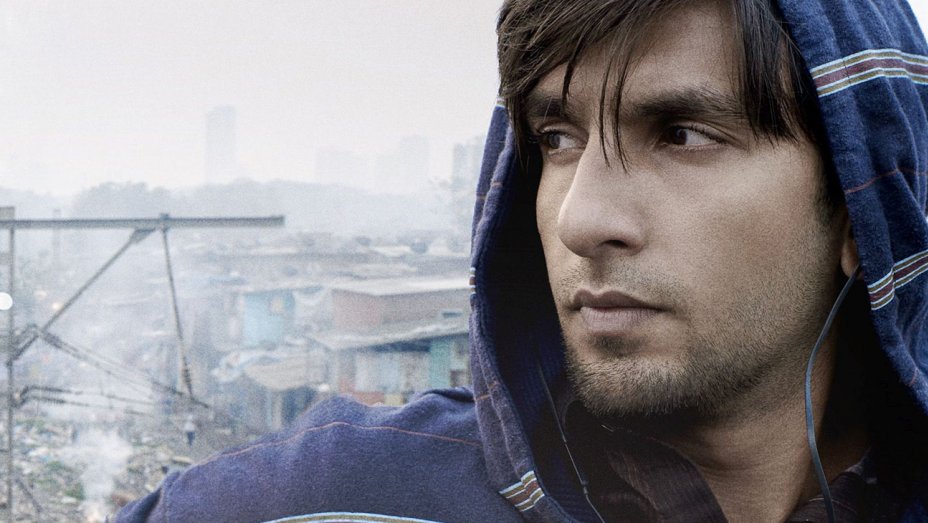Movie Review: 'Gully Boy’
Opened: 14 February 2019
Cast: Ranveer Singh, Alia Bhatt, Kalki Koechlin, Siddhant Chaturvedi, Vijay Raaz, Vijay Varma, Amruta Subhash, Sheeba Chaddha
Director: Zoya Akhtar
Producers: Zoya Akhtar, Farhan Akhtar, Ritesh Sidhwani
Rating: ★★★★½
“In music, silence is more important than sound...” ~ Miles Davis, the most influential and acclaimed figures in the history of jazz and 20th century music.
In Gully Boy, director Zoya Akhtar too uses silences to convey a plethora of emotions even if the film’s prime focus is its music, which unlike other films, is used here to successfully move the story forward – that of Murad Ahmed (Ranveer Singh – in an astonishingly nuanced performance), as a slum-dwelling youngster with big dreams who refuses to let his relatively bleak circumstances cripple the longings of his heart.
A re-telling of the real-life underdog story of two underground street rappers (Divine and Naezy), and one’s meteoric rise to fame, Zoya Akhtar’s Gully Boy charts the journey of a down-on-his-luck college student from Dharavi (Singh), his subsequent brush with fame, and his forbidden love story with a young Muslim girl Safeena (Alia Bhatt).
Alia Bhatt is fiesty, fierce and fabulous in Gully Boy
Seriously. There’s so much going for this film that a few words of praise are unlikely to do it the justice it deserves. Along with its deft writing (Reema Kagti, Zoya Akhtar), what stands tall in Gully Boy, is its mood and setting, which is so rooted in authenticity – the slums, the confrontational rap sequences, those dry, humorous, lovelorn exchanges between Safeena and Murad – that there’s not even a smidgen of it that appears artificial – these are characters you care about, despite knowing full well, exactly how it will all ultimately culminate.
Of course, Akhtar is aided substantially by tinsel town’s most happening heartthrobs Bhatt and Singh (who together set the screen alight), and both of whom are currently riding a wave of success, but their work here is of standards that perhaps they themselves will struggle to replicate any time soon. Bhatt, expectedly, is excellent, giving Safeena touches of vulnerability, feistiness and feministic spunk in equal measures, and kudos here to Kagti and Akhtar, for not resorting to making her character a self-pitying, simpering mess relying on the hero, because having her do that in a film that essentially revolves around the street-rapper could have been the easier way out. There are scenes here; particularly the ones where her insecurities and jealousy come to the forefront and ones where she owns her territorial tendencies with such spontaneity and effortlessness, one finds it difficult to take their eyes of her mesmeric screen presence.
It’s not that this is a just a star show-reel though. Siddhant Chaturvedi in his first mainstream outing as Murad’s earnest mentor completely moulds into his character as the protagonist’s fellow rapper and threatens to steal the show from right under his co-star’s noses, while Kalki Koechlin as Sky, a foreign music student, provides the perfect foil to Safeena’s firebrand. Vijay Raaz and Amruta Subhash get their moments too, but at times they look a tad young as Murad’s parents, and perhaps the script would have benefitted a little from fleshing out their backstory and the root of their unhappiness as a couple.
Like a dormant, simmering volcano that eventually erupts, it is inevitably Singh though, in hands down the most ‘rap’turous performance of his already enviable repertoire, that proves to be the film’s crowning glory in an act so unbridled, so passionate, and so devoid of any frills and gimmicks, that one can already bet he’ll be the front-runner in all the ‘best actor’ lists at the end of the year, and rest assured, it’s going to be difficult for any top rung actors to come even close to the range he displays here – he’s that good.
Despite its so many laurels, the film is a little on the lengthy side, and even though the music is of a high calibre, it could have easily been trimmed by at least twenty minutes instead of risking being consumed by its own excesses, but that’s a minor blemish in a film that displays such a solid grasp of its subject matter and one that’s been as meticulously crafted as this one.
Ranveer Singh is the film’s crowning glory
The Akhtar-Combo delivered before in the criminally underrated Dil Dhadakne Do too, but their work here is of an entirely different standard here. Singh gets under the skin of the character, and Akhtar on her part, gets under the skin and right at the underbelly of Mumbai’s slums and yet, still somehow manages to retain her unique brand of storytelling by subtly delivering messages in the most unexpected ways – for instance, when Koechlin’s character unabashedly sprays ‘brown is beautiful’ all over a Fair & Lovely advert, or when Bhatt’s Safeena challenges her parents to give her the freedom of choice which many take for granted – there are so many novel touches here, and the quirks she gives to each of the characters, even the supporting ones, that it would take several viewings to fully appreciate the magnitude of what she’s delivered here. It isn’t just a smartly packaged film aimed at the youth – it’s a lot more than that, which is perhaps why we often forgive her the slight predictability of the plot, which if it tried to, could have pushed the boat just a little out further to make it the fully path-breaking film it so yearns to be.
Still, there’s enough quirkiness, wit, authenticity and splendid craft on display here for us to forgive a misgiving here and there, and it’s a film that will inevitably make you believe – that ‘apna time bhi aayega’ – if it hasn’t already.













In the rush to find someone to blame for Bollywood actor Sushant Singh Rajput’s suicide, we have overlooked the most obvious culprit: Sushant Singh Rajput himself. A BollyBrit® exclusive by Brooke Anderson.